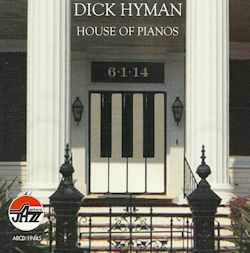1. Send In The Clowns
2. Sweet Georgia Brown
3. Yesterdays
4. Blue Monk
5. Ugly Beauty
6. Beat The Clock Theme
7. All The Things You Are
8. Theme From The Purple Rose of Cairo
9. Misterioso
10. Take The “A” Train
Dick Hyman – Piano
Why “House of Pianos”? This concert was recorded last year at Tim and Renée Farley’s House of Pianos in Madison, Wisconsin. Dick Hyman’s sleeve-notes
ponder on the encouraging influence that a venue full of pianos and dedicated to their repair can have on a piano recital. Hyman also lists the things that
are taught in clinics at the House of Pianos, such as fingering or touch, harmony, shaping phrases, dynamics and tempo, plus improvisation. All these
qualities are manifest in Dick’s concert on this CD. He has a clean, delicate touch. A video on YouTube usefully shows how he plays with his fingers almost
flat on the keyboard: offering legato rather than sforzando. His mental agility is startling, enabling him to improvise most creatively.
The opening Send In The Clowns is a good example of his keyboard mastery. This song is so familiar that it is difficult to improvise
upon, but Hyman makes it work by decorating the melody rather than departing far from it. He throws in a quotation from Jesu, Joy of Man’s Desiring. He plays in a gentlemanly manner, soft and measured.
This doesn’t mean that he is not an adventurous pianist. Three of the items on this CD are compositions by Thelonious Monk, who seldom wrote very
straightforward tunes. This is especially true of Misterioso, an enigmatic climb up the scale which Hyman delivers quite mysteriously. Blue Monk is more familiar and easier to develop. Dick’s approach is calm and exploratory, including a hint of stride piano using single notes in
the left hand. Ugly Beauty is rarely heard, and Hyman says he re-harmonised it for duets with Ken Peplowski. It is a haunting theme which doesn’t
sound particularly Monkish, especially as it is in waltz time. Dick makes it sound like a classical prelude: a very thoughtful performance which flows more
smoothly than Monk’s original version.
Another thoughtful performance is Jerome Kern’s Yesterdays, to which Dick devotes ten whole minutes. He makes this interpretation sound different
from many others by decorating the melody floridly and departing on fanciful excursions – almost like those occasions when an artist plays tunes “in the
style of” various classical composers, or perhaps like Hyman’s own Century of Jazz Piano. So we have some semi-classical sections, passages of
stride piano, a touch of Earl Hines, and other references left for the listener to pick up. Another Jerome Kern composition, All The Things You Are, is given eleven minutes for Hyman to reveal a cornucopia of delights, which again makes its way through a mixture of
styles.
Dick plays short versions of two of his own compositions: the theme from Woody Allen’s film The Purple Rose of Cairo (wistful) and the theme he
wrote and played (on the organ) for three series of the game show Beat the Clock (cheery).
I advise you to buy this and as many other discs as you can find by Dick Hyman, because he is a pianistic genius.
Tony Augarde
www.augardebooks.co.uk
